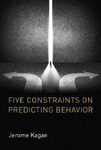Please use this identifier to cite or link to this item:
http://lib.hpu.edu.vn/handle/123456789/33119| Title: | Five Constraints on Predicting Behavior |
| Authors: | Kagan, Jerome |
| Keywords: | Psychology Brain Behavior |
| Issue Date: | 2017 |
| Publisher: | MIT Press |
| Abstract: | Scientists were unable to study the relation of brain to mind until the invention of technologies that measured the brain activity accompanying psychological processes. Yet even with these new tools, conclusions are tentative or simply wrong. In this book, the distinguished psychologist Jerome Kagan describes five conditions that place serious constraints on the ability to predict mental or behavioral outcomes based on brain data: the setting in which evidence is gathered, the expectations of the subject, the source of the evidence that supports the conclusion, the absence of studies that examine patterns of causes with patterns of measures, and the habit of borrowing terms from psychology. Kagan describes the important of context, and how the experimental setting -- including the room, the procedure, and the species, age, and sex of both subject and examiner -- can influence the conclusions. He explains how subject expectations affect all brain measures, considers why brain and psychological data often yield different conclusions, argues for relations between patterns of causes and outcomes rather than correlating single variables, and criticizes the borrowing of psychological terms to describe brain evidence. Brain sites cannot be in a state of "fear." A deeper understanding of the brain's contributions to behavior, Kagan argues, requires investigators to acknowledge these five constraints in the design or interpretation of an experiment. |
| URI: | https://lib.hpu.edu.vn/handle/123456789/33119 |
| ISBN: | 9780262036528 |
| Appears in Collections: | Sociology |
Files in This Item:
| File | Description | Size | Format | |
|---|---|---|---|---|
| Five-Constraints-on-Predicting-Behavior.pdf Restricted Access | 6.9 MB | Adobe PDF |  View/Open Request a copy |
Items in DSpace are protected by copyright, with all rights reserved, unless otherwise indicated.
